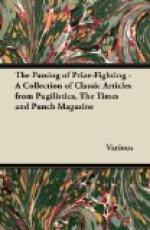It is unnecessary to follow his later achievements in detail. He returned a worn and weary man, having accomplished the round in about a hundred and eighty, but in possession of an appetite which astonished him and those with whom he lunched. In the afternoon, the luck of beginners attending him, he joined a foursome of Professors, and triumphantly brought in his partner an easy victor. In a day or two, he was drinking beer (which he would previously have rejected as poison), was sleeping like a top, and was laying down the law on stimy, and other “mysteries more than Eleusinian.” True, after the first three days, his play entirely deserted Bulger, and even Professors gave him a wide berth in making up a match. But by steady perseverance, reading Sir Walter Simpson, taking out a professional, and practising his iron in an adjacent field, Bulger soon developed to such an extent that few third-rate players could give him a stroke a hole. He had been in considerable danger of “a stroke” of quite a different character before he left London, and the delights of the Bar. But he returned to the Capital in rude health, and may now often be seen and heard, topping into the Pond at Wimbledon, and talking in a fine Fifeshire-accent. It must be acknowledged that his story about his drive at the second hole, “equal to Blackwell, himself, Tom Morris himself told me as much,” has become rather a source of diversion to his intimates; but we have all our failings, and Bulger never dreams, when anyone says, “What is the record drive?” that he is being drawn for the entertainment of the sceptical and unfeeling. Bulger will never, indeed, be a player; but, if his handicap remains at twenty-four, he may, some day, carry off the monthly medal. With this great aim before him, and the consequent purchase of a red-coat and gilt-buttons, Bulger has a new purpose in existence, “something to live for, something to do.” May this brief but accurate history convey a moral to the Pessimist, and encourage those who take a more radiant view of the possibilities of life!
* * * * *
A plebiscite for Parnassus.
[The result of the Pall Mall’s competition for the Laureateship has been to place Mr. Eric Mackay and Mr. GILBART-Smith first and second, and Swinburne and Morris nowhere.]
A popular vote the Laureate’s post
to fill?
Ay! if Parnassus were but Primrose Hill.
The Penny Vote puts lion below monkey.
’Tis “Tuppence more, Gents,
and up goes the donkey!”
* * * * *
Quite moving.—From Far and Near and All Alive, are two excellent “movable toy-books” that will please the little ones (when their seniors are tired of playing with them) far into the Yule-tide season. The author is LOTHAR MAGGENDORFER, a gentleman to whom Mr. Punch wishes a “Merry Christmas and a Happy New Year.” This may appear a little premature, but it is a far cry from England to Germany, and the Sage of Fleet Street has allowed for any delays that may be caused by fogs, railway unpunctuality, and other necessary evils.




